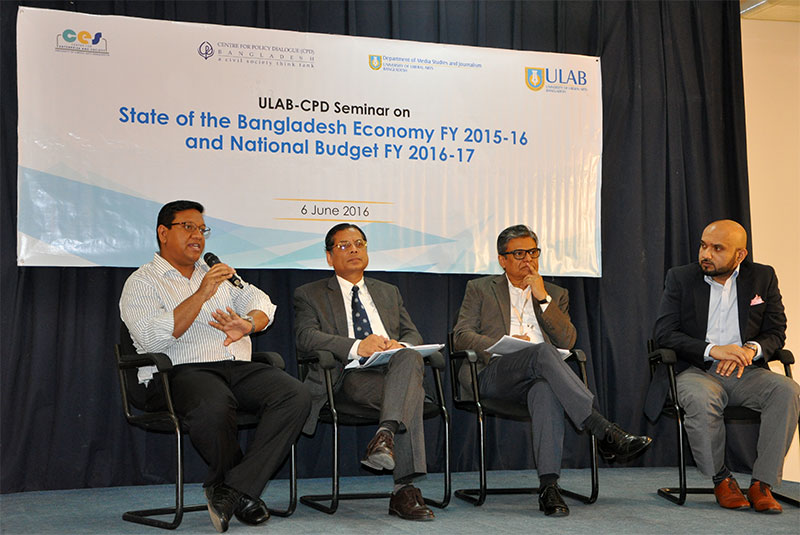Published in The Financial Express on Tuesday, 7 June 2016
Govt needs to borrow more from cheap external sources
FE Report
 Economists at a post-budget meet Monday suggested securing cheap foreign loans in greater volume instead of borrowing high-cost funds from domestic sources to finance the budget deficit in the next fiscal.
Economists at a post-budget meet Monday suggested securing cheap foreign loans in greater volume instead of borrowing high-cost funds from domestic sources to finance the budget deficit in the next fiscal.
The shift, they felt, would help reduce the interest payment burden and avoid crowding out the private sector.
The panel of economists at the seminar pointed out the stagnant private investment as a major challenge for the government as far as the execution of the Tk 3.40- trillion national budget for the financial year (FY) 2016-17 is concerned. They recommended proper use of the country’s macroeconomic stability in the task of alluring private investment.
They also wanted the government to enhance the capacities of various institutions expeditiously, establish good governance and help achieve the desired level of economic growth.
Their suggestions and observations came at a ULAB (University of Liberal Arts Bangladesh)-CPD seminar on ‘State of the Bangladesh Economy FY 2015-2016 and National Budget FY 2016-17’.
Professor Imran Rahman, Vice-chancellor of ULAB, moderated the seminar held at ULAB’s campus auditorium in the capital’s Dhanmondi area.
Speaking at the meet, Executive Director of the Centre for Policy Dialogue (CPD) Prof Mustafizur Rahman noted that the government has proposed borrowing of more than Tk 600 billion from domestic sources, which is very much expensive due to higher rates of interest.
He said the government should focus more on cheaper external borrowing like soft loans, instead of expensive domestic borrowing from local banks and non-banking institutions, in the forthcoming fiscal.
“The government needs to pay 11 per cent to 12 per cent interest on domestic loans whereas the rate of interest for available external resources is less than 2.0 per cent…so, it should be considered seriously,” he said.
At the same time, rate of implementation of the aided-projects needs to be further enhanced as a large volume of committed foreign aid has remained unused.
“Increased pressure on the issues of good governance and transparency in procurement-related activities from the external sources could be a cause for such high dependency on internal borrowing,” he told the function.
Turning to the state of private investment, CPD Research Fellow Towfiqul Islam Khan said the country cannot attract private investment at an expected level despite having stable macroeconomic factors like low inflationary pressure, declining interest rates, resilient growth in export earnings, augmented foreign-exchange reserves and favourable BoP (balance of payments).
“So, we need to take full advantage of current macroeconomic stability to allure more private investment as an additional Tk 800 billion private investment is required to achieve investment-GDP ratio at 23.3 per cent for FY’17 for attaining 7.2 per cent economic growth,” he said
Responding to a question over businesses’ recent hue and cry regarding the VAT (value added tax) matters, he said the country needs a modern law like the Value Added Tax and Supplementary Duty Act 2012 but the main problem is most of them do not maintain accounts, which will be needed to pay the tax.
“That’s why they (traders) chose the option of package VAT and the government rightly proposed to intensify such VAT structure to discourage package-VAT facility,” he said.
Mr. Khan said the government should make its preparation well in consultation with the stakeholders within the next one year and should design a roadmap with short-and long-term measures for the large number of small entrepreneurs who lack enough knowledge to maintain regular accounts.
“But we need such act and the traders must come out of the mentality to this effect,” he added.
The CPD policy analysts also mentioned two possible reasons — incentives provided by the state are not working and high cost of doing business in absence of necessary infrastructure — behind the apathy towards private investment.
Sajid Amit, Director, Center for Enterprise & Society (CES) of ULAB, and Prof. Jude William R. Genilo, Professor and Head, School of Social Science of the university, also spoke at the meet.


